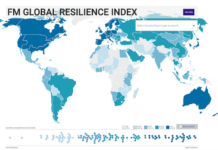A new report from the Urban Land Institute (ULI), a non-profit education and research institute, and Ferguson Partners, a firm serving the human capital and organizational consulting needs of the real assets industries, asserts that taking action on climate-related issues is a central theme for the real estate industry in 2023. This is according to more than 50 sustainability experts who informed the report, “ULI Global Sustainability Outlook 2023”.

The report provides an overview of the widespread challenges facing developers and investors across the Americas, Europe, and Asia Pacific as they attempt to balance implementing longer-term measures to address climate risk with the shorter-term need for return on investment. The report emphasizes the place for cooperation across the real estate value chain, the importance of assessing sustainability in valuation, and the drive toward more transparent and consistent climate regulation.
“Despite the pending recession, real estate is poised to drive value across the industry in 2023 by investing in building decarbonization and sustainability,” said Marta Schantz, co-executive director, ULI Randall Lewis Center for Sustainability in Real Estate. “Increasingly, the regulatory landscape encourages greater climate action, and real estate has an opportunity to collaborate with stakeholders across the value chain to accelerate that progress. We hope this year’s outlook can provide guidance for real estate professionals that are looking to get smart on sustainability issues for the year ahead.”
“Our goal is to help organizations develop, evolve and manage ESG and sustainability strategies with measurable results that realize their ESG goals,” said Ferguson Partners’ Matthew Hardy, who leads the firm’s Australia and New Zealand business and its ESG and sustainability-related initiatives globally. “It is clear these are fundamental to the ethical and fiduciary responsibilities required today. We are proud to partner with ULI on sharing best practices that will help drive this much-needed progress amid the growing climate crisis.”
This is the third edition of the ULI Global Sustainability Outlook, which features insights from ULI member experts on the key ESG issues that will influence strategic decision-making in the year ahead. The report is based on roundtable interviews with members of the ULI Americas Sustainable Development Council, the ULI Europe Sustainability Council, and the ULI Asia Pacific Resilient Cities Council.
The report identified five issues that will shape real estate decision-making in the year ahead:
Adjusting ESG Strategy for Macro-Economic Complications: Elevated inflation and the risk of recession are serious obstacles that have the potential to frustrate companies’ attempts to make significant progress on decarbonizing the built environment. Nonetheless, real estate leaders are navigating the macro-economic complications by safeguarding capital for ESG advancements. Higher energy costs and strong investor willingness to pay a green premium are just two factors bolstering the business case for sustainability.
Embedding Transition Risk in Transactions & Valuations: Real estate leaders are beginning to incorporate the business risk of decarbonization into their properties’ value assessments, particularly when looking ahead to their exit strategy. Rapid progress on measuring transition risk is being made as more companies confront policy, market, legal, and technological risks associated with climate change.
Harnessing the Power of Collaboration: Collaboration across the real estate value chain is proving essential to achieving global sustainability goals. This collaboration includes real estate working alongside governments, community members, tenants, and supply chains. It is often through this that real estate is advancing the ‘S’ in ESG, ensuring that buildings and communities put people and their needs and values first.
Addressing Global Flood Challenges: Rising sea levels and extreme precipitation events due to climate change means that storm surges and floods will increasingly threaten coastal areas as well as inland communities. The industry seeks more accurate data tools to quantify and assess these risks, along with updated flood maps from local and national authorities.
Responding to Government Influence: Across the globe, real estate is responding to government attention to climate action at the local and federal level and the building and portfolio level. However, these environmental regulations often lack consistency. Accordingly, real estate is putting more resources toward compliance, including increasing staffing, as well as identifying opportunities to drive value in their businesses.

















![[VIDEO] Get More for Your Business in Ardmore. Oklahoma](https://businessfacilities.com/wp-content/uploads/2024/02/maxresdefault-324x160.jpg)
